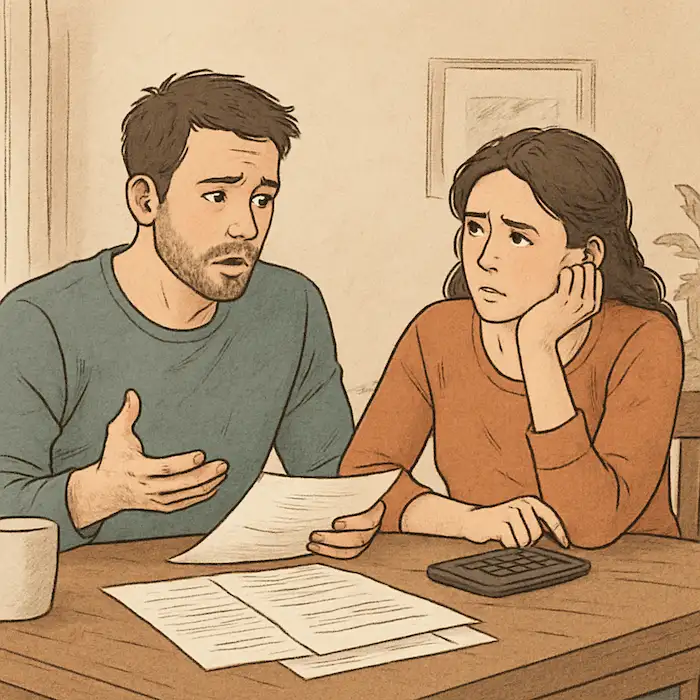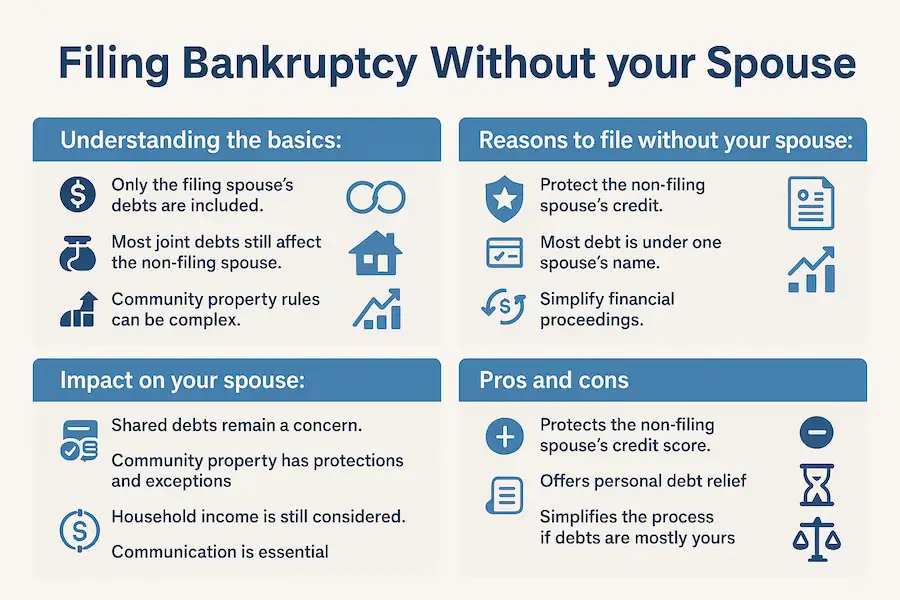
Can I File Bankruptcy Without My Spouse?
Is it Possible to File Bankruptcy Without my Spouse?
Filing for bankruptcy is a significant decision. It becomes more complex when you're married. Many wonder if they can file without involving their spouse. The answer is yes, you can file bankruptcy without your spouse. This choice can protect your spouse's credit score.
However, it's essential to understand the implications. Joint debts and community property laws can affect both partners. This guide will explore the process and impact of filing individually. We'll address common questions and concerns. By the end, you'll have a clearer picture of whether this path suits your financial situation.

Can One Spouse File Bankruptcy? Understanding the Basics
Yes, one spouse can file for bankruptcy without involving the other. This process is called individual filing. Individual filing has specific benefits and considerations. Filing without a spouse can protect the non-filing spouse's credit. It's important to assess the debts involved first. If the debts are primarily in your name, filing alone may be sensible.
It's crucial to know that household income will still be scrutinized. The court considers it during the means test. This test determines your eligibility for Chapter 7 bankruptcy. Choosing individual bankruptcy can simplify proceedings. However, it requires a clear understanding of your financial landscape.
Key points to remember include:
- Only the filing spouse's debts can be addressed.
- Joint debts may still affect the non-filing spouse.
- The non-filing spouse's credit generally remains unaffected, but joint accounts/debts can appear on both credit reports.
- Community property rules are complex: after a discharge in a community-property state, most post-filing community property is protected from pre-petition community claims, but the non-filing spouse's separate property and any nondischargeable debts can still be at risk.
- Both spouses' income will influence the bankruptcy means test.
Understanding these basics helps in deciding how to proceed. Always consider legal advice tailored to your state and situation.
Reasons to File Bankruptcy Without Your Spouse
Filing bankruptcy individually can be a strategic decision. One key reason is to protect the non-filing spouse's credit. This can help maintain better financial options for future planning. Another reason is if most debts are in one spouse's name. In such cases, individual filing may provide a clear benefit. This approach can effectively manage debt without implicating both parties. Some couples choose individual filing to simplify the process. It might reduce the complexity of jointly managing assets and liabilities. Making things straightforward can ease the burden of bankruptcy.
Here are common reasons to file individually:
- Protect the non-filing spouse's credit score.
- Most debt is under one spouse's name.
- Simplify financial proceedings.
- Maintain financial leverage for the future.
Each couple's financial scenario differs. Evaluate carefully before deciding on this route. Professional advice can assist in understanding your unique circumstances.
How Bankruptcy Affects Your Spouse
Filing for bankruptcy can have indirect effects on your spouse. Understanding these implications is crucial. While their credit score might remain unaffected, shared debts could complicate matters. Your spouse's responsibility for joint debts doesn't disappear. They may still face creditors for payment. This can add stress to the relationship if not addressed beforehand.
Community property laws are another factor. In some states, creditors may target joint assets for repayment before discharge; after a discharge, most post-filing community property is protected, but exceptions apply for nondischargeable debts and separate property. Additionally, the non-filing spouse's income might be relevant. During the bankruptcy process, household income, including your spouse's, may be assessed. This is primarily for the means test to determine eligibility.
Here are a few considerations regarding bankruptcy’s impact on your spouse:
- Shared debts remain a concern.
- Community property rules might apply, with protections and exceptions depending on timing and debt type.
- Household income plays a role in the process.
- Communication about financial implications is key.
Discussing these aspects with legal counsel can clear any doubts. It ensures informed decisions that align with your financial goals.
Community Property vs. Common Law States: What Changes?
When filing for bankruptcy without your spouse, state laws influence outcomes. Community property and common law states have different rules impacting the non-filing spouse. In community property states, debts incurred during marriage are typically considered shared. Creditors could pursue these joint assets, even if one spouse files for bankruptcy; however, after a discharge, most post-filing community property is protected from pre-petition community claims, subject to exceptions for nondischargeable debts and separate property. Conversely, common law states treat marital property differently. Only assets and debts in your name affect bankruptcy proceedings. This shields the non-filing spouse, offering some protection to their financial interests.

It's essential to identify which type of state you live in. This impacts how debts are handled during and after bankruptcy. Key differences to note are:
- Community property states treat marital assets as shared (with post-discharge protections for new community property).
- Common law states focus on individual ownership.
- Rules affect debt responsibility and asset protection.
Consulting with a legal expert can clarify your state’s laws. This ensures you're aware of potential implications.
What Happens to Joint Debts and Co-Signed Loans?
Filing bankruptcy without your spouse has implications for joint debts and co-signed loans. It's crucial to understand how these financial obligations are affected. When you file individually, your responsibility for a joint debt could be discharged. However, your spouse remains responsible, creating potential financial strain. This outcome depends on whether debts are solely in your name or shared. Co-signed loans add another layer of complexity. If you discharge your obligation through bankruptcy, co-signers may still be pursued by creditors. This raises concerns for your non-filing spouse who may be impacted by remaining liabilities.
Here are points to consider about joint debts:
- Discharged debts for you may still burden your spouse.
- Creditors can still pursue co-signers for loans.
- Legal advice can clarify your specific situation.
Consulting a bankruptcy attorney before filing can provide valuable insights. This prepares you for managing joint debts during the process.
The Bankruptcy Process When Filing Without Your Spouse
Filing for bankruptcy individually involves a series of steps. Understanding these can help you feel more in control. First, gather detailed financial documents. Include both personal and some household information. This ensures your data is complete and up to date. Next, file the necessary forms with the bankruptcy court. These forms require you to disclose assets, debts, and income. Information about household income, including your spouse’s, is also required.
Upon filing, the court issues an automatic stay. This temporary measure halts most collection activities. It provides a breather from creditors. In chapter 13 bankruptcy, a limited co-debtor stay also protects individuals liable with you on consumer debts; there is no co-debtor stay in chapter 7 bankruptcy.
Here's a step-by-step summary of the process:
- Gather all relevant financial documents.
- Complete and file the bankruptcy forms.
- Attend a mandatory credit counseling session.
- The court issues an automatic stay for debt relief.
Expert guidance can simplify navigating this process. Consulting a bankruptcy attorney can offer clarity and assurance.
The Means Test and Household Income: What to Know
The means test determines if you qualify for Chapter 7 bankruptcy. This test assesses your financial situation based on household income. Even if you file without your spouse, their income is considered. The court uses it to evaluate your ability to pay back debts. The test compares your income to the median for your state. If below the median, you may qualify for Chapter 7. If not, you might need to consider Chapter 13.
Remember these key points about the means test:
- It uses combined household income (with a marital adjustment for amounts not regularly contributed to household expenses).
- Qualifies you for either Chapter 7 or Chapter 13.
- Considers state-specific median income levels.
Understanding the means test is crucial in the bankruptcy process. It affects which bankruptcy type you can pursue.
Protecting the Non-Filing Spouse’s Credit and Assets
Filing bankruptcy individually does not automatically affect your spouse's credit. The non-filing spouse's credit report remains separate. However, joint accounts are different. Debts in joint names can impact both credit reports if not managed well. Protecting assets for the non-filing spouse is also crucial. Typically, only the filing spouse's assets are part of the bankruptcy estate. To ensure protection:
- Keep assets separate when possible.
- Avoid adding the filing spouse's name to assets.
- Seek legal advice for safeguarding property rights.
Planning carefully can help protect the non-filing spouse's financial future.
Pros and Cons of Filing Bankruptcy Without Your Spouse
Filing for bankruptcy on your own has both positives and negatives. It might provide personal financial relief without affecting your spouse's credit directly. However, it could still impact joint debts and future financial plans. Consider both sides carefully:
Pros:
- Protects the non-filing spouse’s credit score.
- Offers personal debt relief.
- Simplifies the process if debts are mostly yours.
Cons:
- Joint debts can still impact both partners.
- May affect future joint financial activities.
- Could lead to complex legal situations.
Evaluating your personal and joint financial health is key to making a sound decision.
Frequently Asked Questions
Filing bankruptcy without involving your spouse raises many questions. Understanding these can aid in decision-making. Below are some common concerns:
- Can one spouse file bankruptcy without the other's consent?
Yes, you can file individually without needing your spouse’s approval. - Will bankruptcy affect my spouse's credit?
No, your filing should not directly impact their credit score. However, joint debts can still pose issues. - Does bankruptcy affect our joint bank accounts?
Joint accounts may be affected, particularly if creditors come after the non-filing spouse.
By examining these questions, you can navigate this complex financial journey more confidently.
When Should You File Jointly Instead?
While filing individually can be beneficial, joint filing is sometimes wiser. Joint filing might be ideal when both spouses carry significant debt. This approach can address shared financial burdens more efficiently.
Consider joint filing if:
- Both have debts surpassing individual assets
- You wish to protect family assets together
- You anticipate improved financial recovery when debts are resolved together
In some situations, tackling issues collectively may offer a clearer path forward, especially when it's a shared financial struggle.
Success Stories of Filing Bankruptcy Without a Spouse
Protecting a Family’s Credit in Arizona
Maria, a schoolteacher in Phoenix, carried nearly $40,000 in credit card debt that was only in her name. Her husband had excellent credit and they planned to buy a home together in the near future. By filing Chapter 7 bankruptcy on her own, Maria was able to discharge the overwhelming debt while protecting her husband’s strong credit score. Within two years, they qualified for a mortgage at competitive rates and purchased their first home—showing how an individual filing can safeguard a family’s long-term financial goals.
Simplifying Finances in a Community Property State
David, a Nevada resident, struggled with medical bills from an unexpected surgery. His wife had no liability on those accounts and had maintained clean credit. Because Nevada is a community property state, David worried about how his filing might affect their joint assets. After consulting a bankruptcy attorney, he filed individually. The community discharge protected most of their post-filing property, and his wife’s credit remained intact. This strategic approach allowed them to maintain financial stability and keep working toward shared retirement plans.
Rebuilding After Business Debts in Ohio
Jonathan co-signed several small business loans that failed during the pandemic. His wife was not involved in the business and had no legal responsibility for those debts. Jonathan filed Chapter 13 bankruptcy individually, creating a repayment plan that fit his income as an engineer. Because his wife’s credit report was untouched, they kept access to car loans and household credit accounts in her name. Over the three-year plan, Jonathan repaid a portion of his debts while protecting his family’s everyday financial flexibility.
Final Thoughts: Making the Right Decision for Your Family
Deciding whether to file bankruptcy without your spouse is significant. Consider your overall financial landscape and future goals. Communicating openly with your spouse is crucial, even if only one is filing. Seek professional advice to understand all ramifications. This can assist you in making the best choice. Bankruptcy affects various aspects of life, but informed decisions can guide your family towards financial stability and peace.